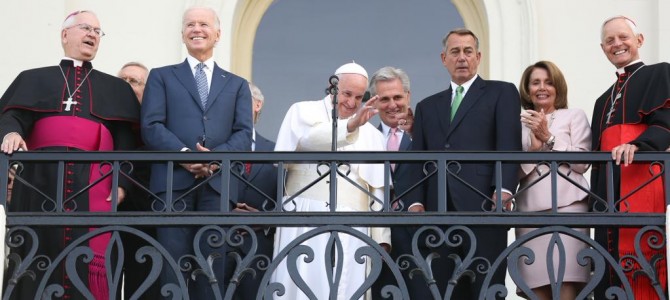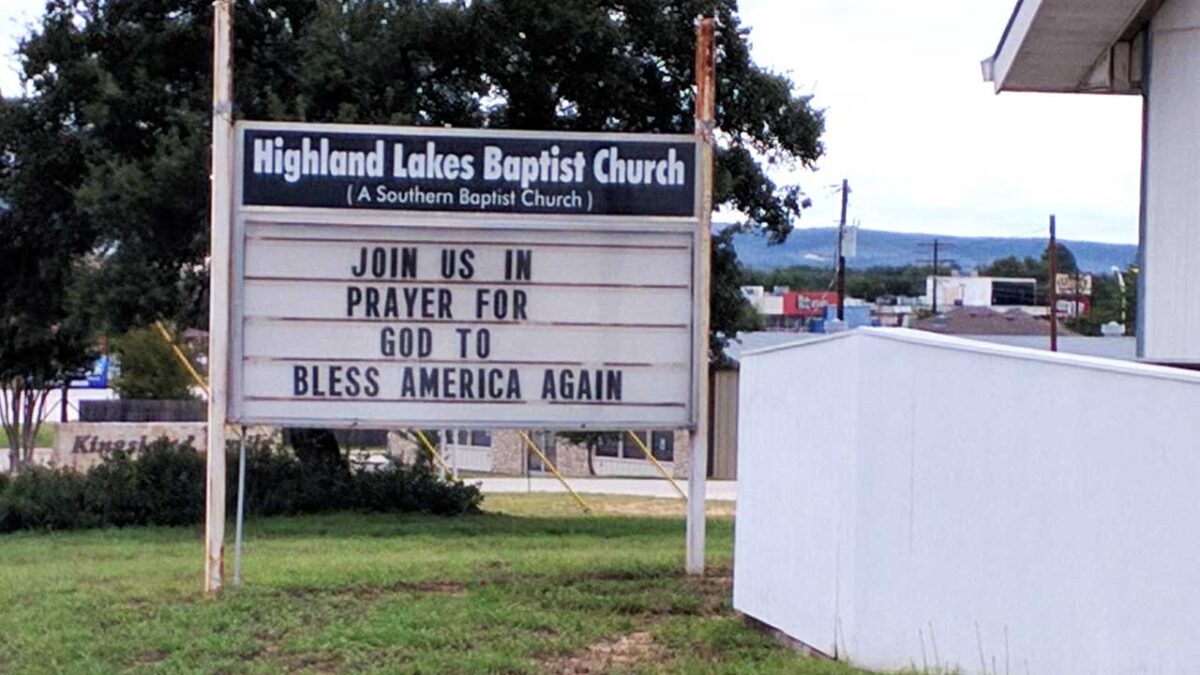
The most interesting thing Pope Francis has said thus far on his trip to America is these comments to U.S. Catholic bishops, urging them to avoid taking “harsh and divisive” stances on contentious issues:
“Speaking to the bishops, Pope Francis acknowledged a “battle between light and darkness being fought in the world,” and recited a litany of injustices the bishops should combat, including abortion, hunger, war, terrorism, drug trafficking and environmental pollution. But he pointedly warned against the “temptation to give in to fear, to lick one’s wounds, to think back on bygone times and to devise harsh responses to fierce opposition.” “Dialogue is our method, not as a shrewd strategy but out of fidelity” to Jesus, he said. “Harsh and divisive language does not befit the tongue of a pastor, it has no place in his heart,” the pope said. “Although it may momentarily seem to win the day, only the enduring allure of goodness and love remains truly convincing.”
More here. “It is not about preaching complicated doctrines, but joyfully proclaiming Christ who died and rose for our sake,” Francis said. “The ‘style’ of our mission should make our hearers feel that the message we preach is meant ‘for us.'” And: “Bishops need to be lucidly aware of the battle between light and darkness being fought in this world,” he said. “Woe to us, however, if we make of the cross a banner of worldly struggles and fail to realize that the price of lasting victory is allowing ourselves to be wounded and consumed.” And: “Otherwise, we fail to understand the thinking of others, or to realize deep down that the brother or sister we wish to reach and redeem, with the power and the closeness of love, counts more than their positions, distant as they may be from what we hold as true and certain,” he continued.”
The Pope’s comments have much good in them, and he echoed many of these sentiments today in his address to Congress. But they also raise questions, spurred by the context of what “harsh and divisive” means, what a dismissal of “shrewd strategy” means… Perhaps he means that the church will not win people back to the flock by being divisive or stressing the importance of doctrine and specific beliefs over the generalized uplift of the Gospel? Perhaps he simply means, in the larger context, emphasizing more the need to be innocent as doves rather than wise as serpents? Perhaps he means that the point of the gospel is not to bring the sword, but peace on earth? Or perhaps he is just being a wise leader, emphasizing the importance of shepherding the flock rather than engaging in pointless argumentation.
The Pope is expressing his views on harshness and division coming from the church in a vague manner – I would like him to be more specific, in part because defending the things Christians believe in the context of the current American culture war is increasingly divisive, not because those beliefs have changed, but because the beliefs of the people have changed. Namely: one side is thoroughly done debating the issues, and believes the other side needs to be banished from polite society and the public square.
It’s all well and good for the Pope to stress the need for dialogue – but stressing this fails to recognize how much that dialogue, particularly on divisive issues, has been crushed by the modern American priorities of political correctness. As John Davidson notes this morning in a piece reconsidering Buckley and Vidal: “There’s little to be gained in arguing with an opponent but much to be gained by mocking him.” This extends beyond the political frame to the cultural, the philosophical, and above all the religious.
The question I would like Francis to answer is whether he honestly believes the Catholic church in America is viewed as a source of divisiveness because its leaders are saying things that are deemed harsh by the culture, or whether it is because they are saying things that are inconveniently true. If he believes it is the former, then his message to the bishops makes a great deal of sense. If it is the latter, I think he has the measure of the conversation about belief in America all wrong. The base measure of dialogue in America today is to grant respect to the legitimacy of all positions at all times, no matter how absurd, amoral, or ill-informed, so long as they are popular and acceptable and favored by the majority of Tweeted responses.
It was interesting to see what the Pope did not mention today. He mentioned the value of all human life and the evil of the ever-decreasing death penalty, but did not once mention abortion or Planned Parenthood. He talked for multiple paragraphs about the importance of environmental stewardship and his confidence policy changes can make a difference, but he did not mention the Little Sisters of the Poor. He talked about the problems of partisanship and polarization, but did not once mention Jesus Christ.
Today, open-mindedness and impartiality are the highest calling for us all. Believing there is a Truth above all Truths — about who we are and who God is — is extremely inconsiderate, harsh, and divisive. Is there anything, after all, more divisive than insisting there is but one true God? But as G.K. Chesterton wrote: “Why should they be impartial, what is being impartial, when the whole world is at war about whether one thing is a devouring superstition or a divine hope?”









